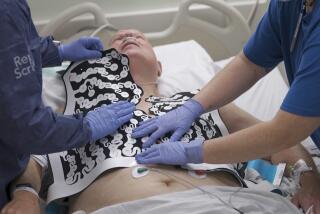Cardiac Patient Treated by Gene Therapy
- Share via
NEW YORK — In what they said was the first application of gene therapy to heart disease, physicians at the New York Hospital-Cornell Medical Center announced Monday that they had injected a gene instructing cells to make new blood vessels into the heart of a 60-year-old man.
The hope is that the heart will grow its own bypasses, opening a new era of treatment.
The gene was carried by a modified virus for the common cold.
“This has the potential to help a lot of people, said Dr. Ronald G. Crystal, principal investigator of the clinical trial, which was announced at a news conference here.
According to the American Heart Assn., about 58 million people in the United States have some form of heart disease, including 13.9 million with coronary artery disease. The latest statistics from the group show that 573,000 people underwent coronary bypass operations in 1995.
If blood vessels can be grown in the heart through gene therapy or other methods, physicians said Monday, it could have a profound effect on patients who need cardiac surgery.
“This is a complete change in direction in the way we treat coronary disease,” said Dr. O. Wayne Isom, chairman of the department of cardio-thoracic surgery at the medical center. “We’re working to really put ourselves out of business.”
In the upcoming issue of the Journal of Thoracic and Cardiovascular Surgery, researchers at the New York Hospital-Cornell Medical Center described successful animal experiments using gene therapy that resulted in cardiac blood vessel growth.
On Dec. 17, surgeons at New York Hospital performed two bypasses on a patient with three clogged arteries. The third artery was so blocked that it could not be operated on.
Instead, a gene-based agent to stimulate the growth of blood vessels was injected into heart muscle near the blocked artery. The hope is that a network of new, smaller blood vessels will grow, compensating for the clogged artery.
Cornell physicians said it will be some time before they know whether new vessels will grow.
In addition to the clinical trial at Cornell, other approaches to induce cardiac blood vessel growth are underway.
“Preliminary laboratory experiments involving the multiple approaches have all looked quite promising,” said Dr. Leslie Leinwand, head of the basic research council of the American Heart Assn.
“It is the first time to my knowledge that a gene-therapy agent has been administered directly to the heart muscle. However, this is quite an invasive procedure, and I think it is important to be cautious and not expect too much from this early safety trial,” she said, adding that “it is important to try various approaches, because there are scientific merits in each of them.”
In November, researchers headed by Dr. Jeffrey Isner at St. Elizabeth’s Hospital and the Tufts University School of Medicine near Boston reported that gene therapy reversed disease in a group of patients with hopelessly blocked blood vessels in their legs.
Unlike the scientists at Cornell, who used a weakened virus to carry the gene, Isner’s group injected the blood vessel growth gene directly into the legs.
At the UC San Diego Medical Center, animal studies have shown that the gene-therapy approach works. But researchers there have moved on to other techniques, using infusions of proteins that cause blood vessel growth.
These proteins can be injected into the bloodstream without the need for direct injection into heart muscle.
“Gene therapy has great promise for the future. But there is a dichotomy whether gene therapy or protein delivery will be the safest or most efficacious for this particular purpose,” said Dr. Frank Giordano, an assistant professor at UC San Diego who has been conducting research into blood vessel growth. “Only extensive clinical trials should provide the answer.”
At Boston’s Beth Israel Medical Center, researchers are developing another technique, involving coating the outside of blood vessels that have undergone coronary bypass surgery with a compound that contains vascular growth factors, an approach that has proved promising in animal studies.






